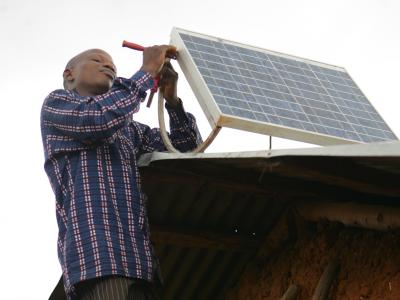
Climate-induced pressures are negatively impacting impacting the energy sector in Benin. As average temperatures rise, electricity demand is increasing - with more intensive and longer use of air conditioning, ventilation and refrigeration needed during the year. Coupled with inefficient household and commercial equipment (fridges, TV, AC, fans) and non-efficient lighting of buildings, there are critical imbalances in the energy sector.
With a view to improving the energy supply system, the quantity and the quality of energy sources and enhance the efficiency of energy supply and demand, this project, Strengthening the Resilience of the Energy Sector in Benin to the Impacts of Climate Change, will work with the Government of Benin to enhance the human, institutional and regulatory capacity for a better planning and management of the energy resources; to increase the production, transport and distribution of the different forms of energy; and to improve poor rural access to energy. The main objective of the project is to reduce the impacts of climate change and variability on Benin’s energy sector
- National
- Country Office
- Local Governments
- National Governments
- Ministère de l'Environnement, de l'Habitat et de l'Urbanisme, Benin
- Global Environment Facility (GEF)
- United Nations Development Programme (UNDP)
Expected outcomes
Outcome 1: Key energy policies, strategies and management and planning tools for the energy sector have integrated climate risks and adaptation measures.
Outcome 2: The climate resilience of the most vulnerable wood supply zones (for energy) is strengthened in response to climate change and variability impacts.
Outcome 3: Livelihood options and living conditions of the most vulnerable communities are made more resilient to the impact of climate change in the energy sector.
Bénin/ Ministère de l’Energie : Les cadres en formation pour l’élaboration d’un plan stratégique
Les Pharaons
Monday 6 August 2018
Le ministère en charge de l’Energie aura bientôt son plan stratégique pour la période 2019-2023. Mais en attendant cela, les cadres de ce département ministériel ont participé à un atelier sur la méthodologie d’élaboration du plan stratégique. Il s’est tenu le 31 Juillet 2018 à Porto-Novo. Une occasion de renforcer leurs capacités afin d’atteindre les objectifs qui seront fixés dans ce plan. Le Ministère de l’Energie veut mettre fin à l’improvisation et à la navigation à vue pour les cinq prochaines années. Les cadres et les partenaires techniques et financiers ont alors décidé d’élaborer une feuille de route afin de relever les nombreux défis qui les attendent. L’ambition du Gouvernement pour le secteur de l’énergie rejoint celle de du 7ème Objectif pour le développement durable (Odd). C’est celle de rendre une énergie propre disponible pour tous et à un coût abordable. A en croire les cadres du ministère, cette convergence de vues facilite la collaboration entre le Programme des nations unies pour le développement (Pnud) et ce ministère. Selon le Ministre Jean-Claude Houssou, les enjeux au cœur de l’élaboration du Plan stratégique sont normes et requièrent des cadres de son ministère de l’abnégation, la disponibilité, l’appropriation d’une démarche méthodologique optimale Quant à Siaka Coulibaly, le représentant-résident du Pnud au Bénin, il a déclaré que son institution ne ménagera aucun effort pour apporter son appui pour le bon aboutissement du processus en cours. Il faut souligner que plusieurs communications ont meublé cette rencontre. D’importantes recommandations ont été faites à l’issue de ces travaux.
The project will support the achievement of the following key results: Mainstreaming climate change into energy policies and management and planning strategies and tools, introducing sustainable land and forest management practices for strengthening the climate resilience of wood energy supplying areas, and promoting the transfer of efficient technologies of production and use of wood energy and alternative forms of energy.
Component 1 : Mainstreaming climate change into energy policies and management and planning strategies and tools
Outcome 1: Key energy policies, strategies and management and planning tools for the energy sector have integrated climate risks and adaptation measures
Component 2: Sustainable land and forest management practices for strengthening the climate resilience of the zones supplying wood for energy
Outcome 2: The climate resilience of the most vulnerable wood supply zones (for energy) is strengthened in response to climate change and variability impacts
Component 3: Technology transfers to strengthen the resilience of livelihoods and living conditions of the vulnerable communities
Outcome 3: Livelihood options and living conditions of the most vulnerable communities are made more resilient to the impact of climate change in the energy sector
The project was officially launched on the 22nd November 2016, by the Minister Energy at Viga Hotel in Bohicon (Centre of Benin).
- UNDPHenry Rene DioufRegional Technical Advisor
- Saliou ToureTechnical Specialist, RSCSA

